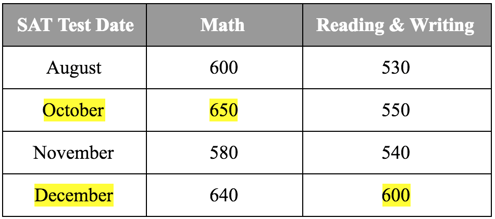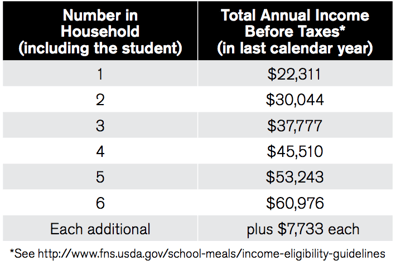4 min read
ACT and SAT Must-Knows for High Schoolers
We recently published a podcast episode on this topic. This blog post provides a recap of what we covered during the episode. Hi! It’s Abby from...
Free for students & their families
Seamlessly integrated, affordable systems for use across your district.
Career Readiness for 6-8 grade, built to guide and track progress in the early years of career exploration.
Scoir + Common App are integrated for the 2025-26 academic year!
Check out content and practical guides to help inform your enrollment strategies and programs.

Most people venturing into the college admission process have heard about the SAT and the ACT tests.
Words like score choice, superscoring, self-reporting, test flexible, and test optional can be super confusing and stress-inducing.
Don't worry! In this blog post, we break these concepts down in a way that is simple to understand.
It’s important to know these college application and admission terms since you'll hear them while touring, researching, and applying to colleges. Often times, these terms are thrown around by experts as if they are a part of everyone’s everyday discussions. While they might not have been in your life before, once you journey down the college admissions road, they quickly become part of your world.
So, let’s demystify these terms!
|
|
Score choice, which is offered for both the SAT and ACT, allows you to decide which test dates to send to your colleges.
For example, if you took the SAT or ACT four times, you don’t have to send all four score reports to the colleges. Instead, you can decide which one you would like to send.
Let’s say you took the SAT in August, October, November, and December and scored your best on the August and November tests. By using score choice, you only have to send in the August and November test results. The colleges will not see how you scored on the October or December tests.
There are a few things to keep in mind.
First, some colleges, particularly the most selective ones, may want you to send in your scores from all of the tests that you have taken. It is your responsibility to know the policy of each school to which you apply, and the best source for this information is to go directly to each school’s website, especially since admission policies can change from year to year. While most Ivy League colleges require all of the tests taken to be sent, Princeton University states, “We allow applicants to use the score choice feature of both the SAT and ACT, but we encourage the submission of all test scores.” While the word “encourage” might be difficult to interpret, Princeton clearly states that sending all test scores is not mandatory.
The second important point to understand about score choice is that it doesn't mean you can choose which sections of a particular test day’s scores to send. In order to do that, the colleges must allow superscoring (more on that later).
The College Board helps to clarify what score choice is: “No, you can’t choose to send your Math score from one test day and your Evidence-Based Reading and Writing score from another test day. But some colleges use superscoring, which means they consider your highest section scores across multiple test dates."
To recap, when a college allows for score choice, you can choose which test day reports to send in (for the ACT or SAT).
Let’s break this down a bit more. The student below took the SAT test four times and here are the results:

As highlighted, this student’s highest Math Section (650) was on the October test and the highest Evidence-Based Reading and Writing Section (600) was on the December test. By using score choice, this student should only submit the October and December test scores to colleges. Now keep in mind that the colleges will see both sections from the October test and both sections from the December test; however, most schools only take into consideration the students highest scores for each section, also known as superscoring.
As mentioned above, most colleges will take into consideration the students best scores from different test sections. The chart above demonstrates that the student’s superscore would be a 1250, which is taking the 650 math from October and the 600 Evidence-Based Reading and Writing from December.
Let’s take a look at an ACT example for a student who took the ACT three times: once in July, once in September, and once in October.

What’s important to understand is that the composite score for a specific test date is the average of the four test sections added together and divided by four, which is shown above in the last column. To find out the composite superscore, take the best score in each section, regardless of test date, and find the average.
In this case, the student’s best composite score is comprised of the numbers highlighted above: 30 (English/September), 27 (Math/October), 26 (Reading/October), and 27 (Science/October). The total composite score is a 27.5, which is rounded up to a 28, and is clearly better than any individual composite score. As a result, if the college allows score choice and also superscores test results, a student would only send the test reports from September and October.
While the majority of schools superscore an applicant’s test results, there are several schools that do not superscore and instead only evaluate the best test taken on one day. To discover each school’s testing policies, navigate to their college’s admissions page.
The cost to register for the SAT is $60. The ACT test price ranges from $68 (without the essay) to $93 (with the essay) for each test taken. Fee waivers are provided to students from low-income families as a way to make college going more affordable.
The College Board explains that you are eligible for a fee waiver if:
The ACT’s guidelines are similar; however, they published a version of the federal government's requirements, of which the two main factors are family income and number of people in the house.

Students who qualify for fee waivers are also able to send their score reports to colleges for free. In fact, the College Board allows “unlimited score reports to send to colleges,” which is a savings of $12.00 per school.
Similarly, the ACT allows that "students from low-income families who take the ACT with fee waivers will be allowed to send ACT score reports for free to colleges and/or scholarship agencies at any time during their college search process.” The ACT further explained that, “The free score reports—up to 20 for each test students take with a fee waiver—will never expire, so students may use them whenever they wish.” The savings is even greater for the ACT test, which typically charges $18.00 per test date per report.
In addition to the cost of taking and sending the tests, most students will likely spend time preparing for these tests. Thankfully, there are now comprehensive, free resources available to students, as outlined in SAT and ACT Resource Guide: From Free Prep to Private Tutoring.
For more info on ways to save money throughout your college experience, check out our blog post on the new FAFSA for the 2024-2025 academic year.
In some cases, students may also self-report their SAT or ACT scores to colleges, yet another savings opportunity for the students.
Yes, for some schools! As a result of the increasing costs associated with applying to college, some colleges are now allowing students to self-report their SAT and ACT scores when they apply to college, which often saves the students hundreds of dollars.
For example, Amherst College offers three ways in which students can self-report their standardized tests:
Thankfully, this trend has gained significant momentum over this past year. Previously, students were required to send their SAT and/or ACT scores to each college when they applied to the school. With self-reporting, the students only need to send the official score reports to the college to which they enroll. So, one report to one college will only be $12.00 for the SAT and $18.00 for the ACT.
If a college's policy permits it, students may also choose to apply test optional in Scoir.
Test flexible can mean different things to different colleges. Typically, test flexible means that you still need to submit some form of standardized test or tests; however, the applicants can choose which test(s) best represent them as a student. In fact, “NYU has one of the most flexible testing policies of any college or university. To be eligible for admission, you must submit one of the following:
Please take note of the asterix symbol at the end of several of these options. It's important to note that most test-flexible and/or test optional schools often have exceptions. As a result, it is extremely important that you look into each schools’ testing policies.
Fairtest.org is a great resource for finding schools that are test optional. On the surface, it may seem like you do not need to send in any test scores for these institutions. While some colleges do not require tests at all, there are exceptions to the test optional policies at many of the 1,900 colleges that are now listed on Fairtest.org’s website. It's crucial to recognize the numerical footnote at the end of many of the colleges listed; the footnote tells the full story. As you can see below, there are many exceptions.

Source: Fairtest
While it’s fantastic that there are some colleges with test flexible and test optional policies, I caution you to take the time to understand each school’s policy. Do not simply look at these 1,900 colleges and assume that you do not need to take any standardized tests.
Understanding the terminology around standardized tests will hopefully make you feel a little more in control of this often overwhelming process. With this knowledge, you can navigate through the process and make the best decisions for you, while hopefully saving some money along the way.
Are you looking to take the digital SAT soon? Check out our blog post that answers the top questions we are asked about the digital SAT next!
This article was originally published on May 12, 2018. It was updated on August 11, 2023 for accuracy and comprehensiveness.

As a former teacher, published author, independent counselor, and active lecturer, Karen is a well-respected educator dedicated to preparing students for higher education and helping them navigate the college admissions process.

4 min read
We recently published a podcast episode on this topic. This blog post provides a recap of what we covered during the episode. Hi! It’s Abby from...

6 min read
Gaining admission to the college(s) of your choice might weigh heavily on your mind at the moment. The odds are that the prospect of affording...

8 min read
The Free Application for Federal Student Aid (FAFSA), managed by the Department of Education, is the gateway to federal and state financial aid for...